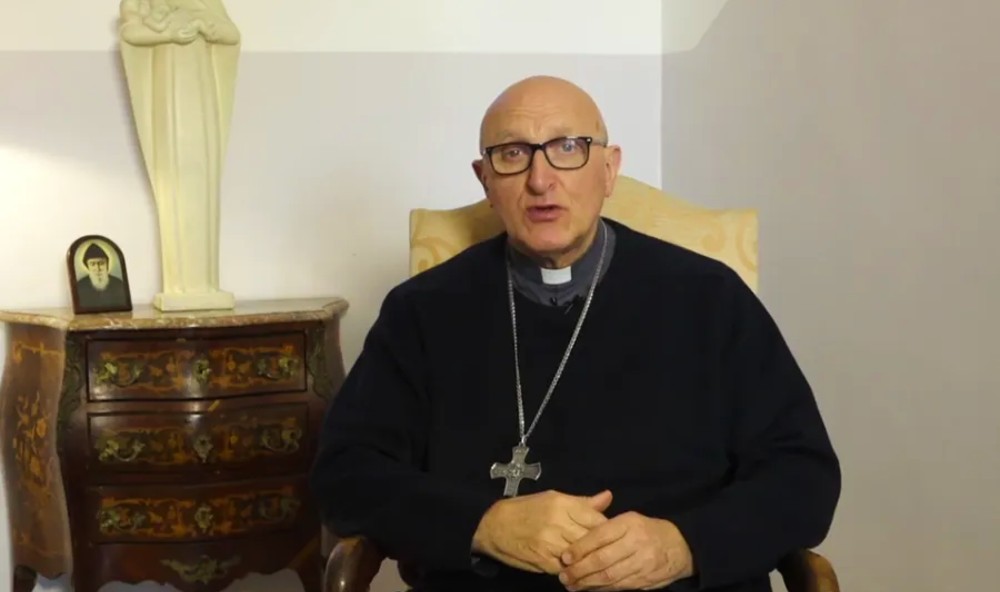We ask you, urgently: don’t scroll past this
Dear readers, Catholic Online was de-platformed by Shopify for our pro-life beliefs. They shut down our Catholic Online, Catholic Online School, Prayer Candles, and Catholic Online Learning Resources—essential faith tools serving over 1.4 million students and millions of families worldwide. Our founders, now in their 70's, just gave their entire life savings to protect this mission. But fewer than 2% of readers donate. If everyone gave just $5, the cost of a coffee, we could rebuild stronger and keep Catholic education free for all. Stand with us in faith. Thank you.Help Now >
Coptic Christian Priest Prefers Martyrdom to Slave Tax in Egypt
FREE Catholic Classes
After the sweeping political victories Islamists made in the early round of elections in Egypt, the Deputy Patriarch of the Coptic Catholic Church Yohanna Qulta was interviewed on Arab television concerning the looming threat that Egypt's Christian communities will face in an Islamist society. The interview gives us unusual insight into the mind and heart of our Coptic brothers and sisters.
Highlights
Catholic Online (https://www.catholic.org)
1/17/2012 (1 decade ago)
Published in Middle East
Keywords: Copts, Yohanna Qulta, Egypt, Elections, Muslim Brotherhood, Salafis, Michael Terheyden
P>KNOXVILLE, TN (Catholic Online) - After the sweeping political victories Islamists made in the early round of elections in Egypt, the Deputy Patriarch of the Coptic Catholic Church Yohanna Qulta was interviewed on Arab television concerning the looming threat that Egypt's Christian communities will face in an Islamist society. The interview gives us unusual insight into the mind and heart of our Coptic brothers and sisters.
Although the interview is only a few minutes long, the Deputy Patriarch's comments are wide-ranging and pack a powerful punch. They cannot be ignored. Therefore, I have included the interview in the attached video at the top of this page if you want to watch it. I also recap and discuss three points gleaned from the interview.
The three points are as follows: First, the West's failure to assist persecuted Christians in the Middle East and around the world. Second, Yohanna Qulta's excellent insight into the reason for the separation of church and state. Third, his willingness to sacrifice himself to the point of martyrdom gives us an example of courage and how we are to live.
The West's failure to assist persecuted Christians
What Yohanna Qulta said about America was painful to listen to. He said, "What did America - with 150,000 soldiers armed to the teeth - do for the Christians of Iraq? Churches were [burned] down, Christians were martyred, and America did nothing. What did America do for the Christians of Lebanon? What did it do for the Arab Christians? What did it do for the Christians of Rwanda and Burundi, one million of whom were killed?"
It was not his intention to accuse America, but to vocalize a reality he perceives, that the Copts, and Christians living in other Muslim countries, are essentially alone and cannot rely on America or any Western nation to help them. Given this harsh reality, the Deputy Patriarch believes that the Copts are at the mercy of their Muslim neighbors and will have to plead their case before them. He told the interviewer, "We will not turn to the UN or to the Western countries, but to Al-Azhar, to Islamic moral values, and to the vast majority of Muslims, who are moderate."
The Deputy Patriarch's comments remind us that when our Christian brothers and sisters are persecuted anywhere in the world, all Christians everywhere are diminished and harmed. This is true because we are all members of one body, the Mystical Body of Christ. In Acts 9:4, when Saul was persecuting the early Christian Church, Jesus said, "Saul, Saul, why are you persecuting me?" We may not see this reality or understand it, but it is true nonetheless.
However, we not only share in their suffering, we also share in the grace they merit for the Mystical Body, the Church. Thus, we need to open ourselves to God's gift of grace which is being poured out in exchange for the blood of all His holy martyrs. And when we do, despite the brokenness of the Christian family, Christians will begin to see themselves as one body, that is, one family belonging to Christ. And once Christians around the world unite, we will become the greatest power the world has ever known, for God will surely set us ablaze and use us to renew the face of the earth.
Separation of church and state
Realizing that the well-being of the Coptic community, maybe even its very survival, depends upon the separation of church and state, Deputy Patriarch Qulta also gave a passionate and reasoned appeal for Muslims to consider this form of governance.
He said, "The Church was liberated the day religion was separated from state. . . . It has been proven that a religious state is not compatible with human nature. The role of religion is to educate the human conscience. It shapes the conscience of humans, so that merchants have a conscience, engineers have a conscience, laborers have a conscience. Religion is not supposed to regulate traffic or taxes, or to determine whether one should wear the hijab or niqab. Religion is supposed to advise and guide, but to leave one with freedom of choice."
This is what we generally mean when we refer to Muslim society becoming secular. We are referring to a secular approach to governance and promoting a pluralistic society that allows for the coexistence of Muslims and non-Muslims, which is a meaningful example of tolerance. Viewed from this perspective, it is easy to see that a secular approach to governance serves to protect religion, not to reject it.
This is obviously not the same thing as modern Western secularism, which is not open to religion to educating the human conscience, or advising and guiding the people in social, economic and political matters. Rather, Western secularism is an ideology with its own unique claim to having a "morality". By definition it is supposed to be neutral toward religion, but in practice, it is aggressively anti-Christian because it wants to educate our conscience according to a materialistic and atheistic world view.
Consequently, we find Christians being persecuted in the name of Islam throughout the Muslim world, and we find Christians being increasingly persecuted in the name of secularism throughout the Western world. Neither society is pluralistic or tolerant in a true sense. While Deputy Patriarch Qulta's comments were intended for people living in Muslim societies, people living in the Western societies also need to heed his comments.
Martyrdom promotes living not dying
This final point is based on the Deputy Patriarch's comment concerning martyrdom. He made the comment when his Muslim interviewer asked if the Copts feared recent statements being made by the Salafis, and if the Copts were thinking about leaving Egypt. (The Salafis were responsible for much of the violence against the Copts last year, and their success at the polls put them in the number two spot, right behind the Muslim Brotherhood).
Deputy Patriarch Qulta's comment is as follows: "Absolutely. . . . The fear we encounter on TV and in national newspapers, which I don't want to name... Actually, why not? Al-Ahram, Al-Akhbar... They run large headlines, quoting the Salafis as saying that the Copts should either leave Egypt or pay the jizya poll tax in submission. . . . We will oppose this fiercely, to the point of martyrdom. . . . Gone are the days of paying the jizya, the days of slavery. . . ."
The idea of "jizya" goes way back. It can be found in the Koran. According to one translation, chapter 9:29 reads, "Fight those who believe not in Allah nor the Last Day, nor hold that forbidden which hath been forbidden by Allah and His Messenger, nor acknowledge the religion of Truth, [even if they are] of the People of the Book, until they pay the Jizya with willing submission, and feel themselves subdued."
The online edition of the Encyclopedia Britannica gives us an interesting explanation of jizya. Based on Islamic law, non-Muslims fall into one of two categories. The first category is made up of pagans. The second category is made up of "people of the book," meaning people whose religion is based on sacred texts. This includes the Jews and the Christians. Muslims refer to people who fall into this category as dhimmis.
The dhimmis were allowed to live in Muslim society and to practice their religion, but in return, they were required to pay a special poll tax known as the jizya. Payment of this poll tax was understood to be a mark of their submission to the Muslim authority. But it was more than that; it was a mark of total subjugation and humiliation, for the dhimmi class was more like a slave class in Muslim society.
Yohanna Qulta 's willingness to die before paying the jizya and submitting to a life of slavery gives us insight into the hearts and minds of our Coptic brothers and sisters. It also gives us an example of courage and how we are to live. In his book, C. S. Lewis for the Third Millenium, the Catholic philosopher Peter Kreeft describes this way of life in a simple formula: "If you have nothing worth dying for, you will die. If you have nothing worth living for except mere living, you will not live."
Do we have the courage to really live the life God has given to us? If so, what are we willing to die for? Are we willing to die for our freedom, for truth and justice, for our families, for our spiritual brothers and sisters, for our faith?
-----
Michael Terheyden was born into a Catholic family, but that is not why he is a Catholic. He is a Catholic because he believes that truth is real, that it is beautiful and good, and that the fullness of truth is in the Catholic Church. However, he knows that God's grace operating throughout his life is the main reason he is a Catholic. He is greatly blessed to share his faith and his life with his beautiful wife, Dorothy. They have four grown children and three grandchildren.
-----
---
'Help Give every Student and Teacher FREE resources for a world-class Moral Catholic Education'
Copyright 2021 - Distributed by Catholic Online
Join the Movement
When you sign up below, you don't just join an email list - you're joining an entire movement for Free world class Catholic education.
-

-
Mysteries of the Rosary
-
St. Faustina Kowalska
-
Litany of the Blessed Virgin Mary
-
Saint of the Day for Wednesday, Oct 4th, 2023
-
Popular Saints
-
St. Francis of Assisi
-
Bible
-
Female / Women Saints
-
7 Morning Prayers you need to get your day started with God
-
Litany of the Blessed Virgin Mary
Meta's New Commitment to Free Speech and Its Potential Impact on Online Discourse
-

Pope Francis Accepts Resignation of Bishop Dominique Rey of Frejus-Toulon
-

Bound by Betrayal: Katie's Struggle with Lust, Lies, and Redemption
-
John: A Story of Addiction, Hopelessness, and the Search for Redemption
-
Science vs. Faith: The Battle for Truth and Hope
Daily Catholic
 Daily Readings for Thursday, January 09, 2025
Daily Readings for Thursday, January 09, 2025 St. Adrian, Abbot: Saint of the Day for Thursday, January 09, 2025
St. Adrian, Abbot: Saint of the Day for Thursday, January 09, 2025 Prayer for a Blessing on the New Year: Prayer of the Day for Tuesday, December 31, 2024
Prayer for a Blessing on the New Year: Prayer of the Day for Tuesday, December 31, 2024- Daily Readings for Wednesday, January 08, 2025
- St. Thorfinn: Saint of the Day for Wednesday, January 08, 2025
- St. Theresa of the Child Jesus: Prayer of the Day for Monday, December 30, 2024
![]()
Copyright 2024 Catholic Online. All materials contained on this site, whether written, audible or visual are the exclusive property of Catholic Online and are protected under U.S. and International copyright laws, © Copyright 2024 Catholic Online. Any unauthorized use, without prior written consent of Catholic Online is strictly forbidden and prohibited.
Catholic Online is a Project of Your Catholic Voice Foundation, a Not-for-Profit Corporation. Your Catholic Voice Foundation has been granted a recognition of tax exemption under Section 501(c)(3) of the Internal Revenue Code. Federal Tax Identification Number: 81-0596847. Your gift is tax-deductible as allowed by law.







 Daily Readings for Thursday, January 09, 2025
Daily Readings for Thursday, January 09, 2025 St. Adrian, Abbot: Saint of the Day for Thursday, January 09, 2025
St. Adrian, Abbot: Saint of the Day for Thursday, January 09, 2025 Prayer for a Blessing on the New Year: Prayer of the Day for Tuesday, December 31, 2024
Prayer for a Blessing on the New Year: Prayer of the Day for Tuesday, December 31, 2024

